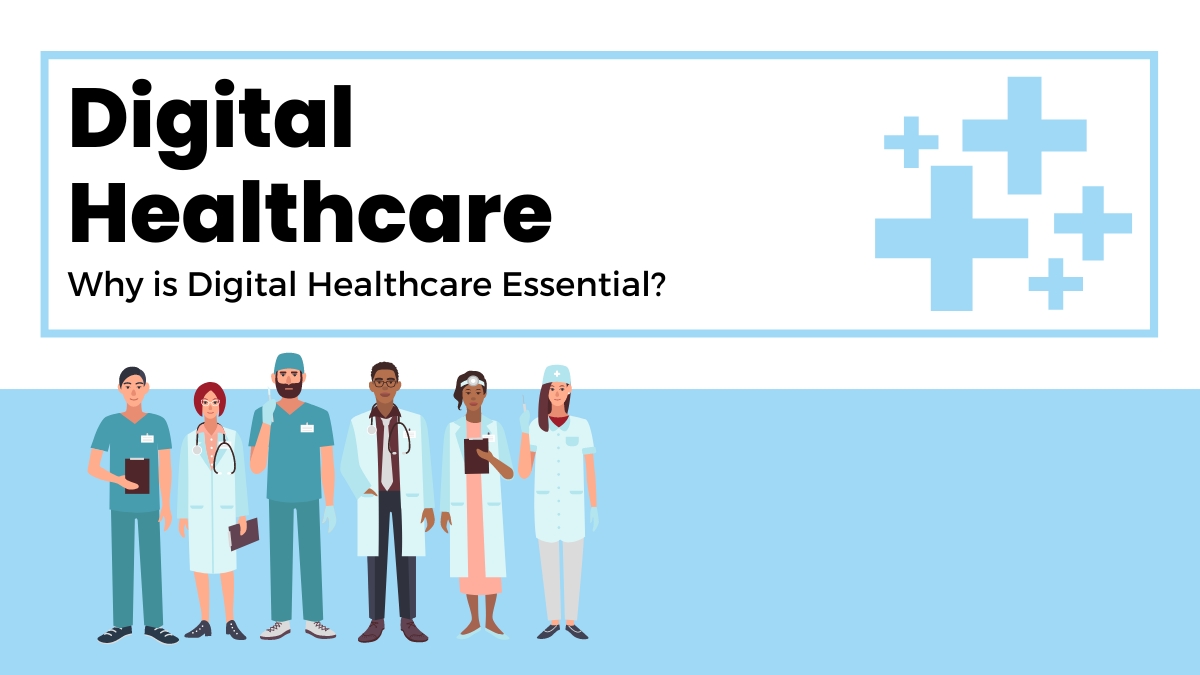
For us humans, our health comes before anything else. And neglecting digital technology in the healthcare sector can have drastic consequences on our physical and mental well-being. Previously, it was perceived that this sector required face-to-face consultation with healthcare professionals and their patients. However, digitalization has greatly modified this perception, and now, the healthcare sector has become more sophisticated and advanced than ever before. But without knowing the importance of digital healthcare, we cannot benefit from its numerous benefits.
As a multidisciplinary concept, digital healthcare bridges gaps between technology and healthcare. It comprises several key aspects, especially software and hardware, that are specifically designed to aid the healthcare industry in executing its digital operations efficiently. Other than them, some of the essential components of digitalization in healthcare are:
- mhealth (mobile health) apps
- Electronic Health Resources (EHRs)
- Electronic Medical Records (EMRs)
- Telehealth
- Telemedicine
- Personalized medicine, and
- Wearable devices
The importance of digital healthcare is not limited to a single aspect only. Digital healthcare can do wonders everywhere, from the diagnosis to the treatment to the patients’ facilitation and hospital management. Stakeholders of digital healthcare include patients, doctors, hospitals, pharmacies, researchers, and software and application developers. Also, medical device manufacturers and distributors benefit significantly from integrated and sophisticated digital healthcare systems.
Why is digital healthcare essential?
Digital healthcare practices are pretty extensive. They incorporate required tools and technology in AI (Artificial Intelligence), interoperable data¸, and other secure and open platforms. The importance of this modern technology in medicine can be understood because it has enabled many patients to consult their doctors (or healthcare providers) directly. This reality also stems from the fact that certain circumstances, such as a worldwide pandemic, can force people to seek medical care and attention remotely.
The implication of Digital Healthcare during the Coivd-19 Pandemic:
One of the most prominent examples of where people benefitted from digital healthcare is the lockdowns that various governments imposed during the height of the Covid-19 pandemic. During these lockdowns, people were told to practice social distancing, and in the regions with higher infection rates, they were also barred from coming out of their homes. During this condition, digital healthcare and its associated technologies assisted people in consulting their doctors and physicians.
But the application and the scope of digital healthcare are not limited to this situation only. Below, we have mentioned some scenarios where digital healthcare and remote care can come into play:
- A condition where an immobile patient, without anyway of ambulation, requires medical attention
- A condition where an environmental disaster, such as a hailstorm or a hurricane, has forced people to stay inside their homes, and they require medical care
- A condition where a person requires healthcare but wishes to stay anonymous
These are a few conditions where digital healthcare and its associated practices can be duly implemented. With further technological advancement, we can take its implications further and benefit the global population easily. However, an important point to be remembered here is that not every company and establishment is pioneer enough to provide these digital services for the healthcare sector. Rather, this digitization demands adequate expertise and dedication, and fortunately enough, you can find one such establishment in the form of Bekey.io that can help you with various digital healthcare practices.
Examples of digital health technology
One of the basic purposes of incorporating digital technology in the healthcare sector is to reduce the extent of challenges faced by this industry. They can help all the stakeholders save time on lengthy processes, make the procedures more accurate and improve their quality, enhance the quality of patient care, and combine different technologies, such as IoT, blockchain, and mHealth. Here, we will list examples of how these technologies have improved healthcare and its subsequent fields.
IoT and its Role in Improving Healthcare
When combined with healthcare, IoT (Internet of Things) becomes IoMT (Internet of Medical Things). IoMT combines medical devices and applications connected with IT systems using networking technologies. IoT is widely used to improve communication among patients and their health providers. Another important IoMT invention is the smartphone-based pacemaker. With this pacemaker, the necessary data can be transmitted to the patients and their healthcare providers’ networks. This can give both of them a better insight into their health status.
mHealth and its Role in Enhancing Healthcare Practices
Using mHealth is associated with treating chronic conditions like rheumatoid diabetes mellitus and hypertension. This technology includes different wearable devices, applications, and other mobile-based technologies. In this regard, mentioning personal wearable devices is crucial. Their use has seen a surge, particularly after the recent pandemic, and many patients suffering from chronic health conditions are using them. These devices collect important data related to their health condition and relay it to their doctors. Also, many devices are advanced enough to collect and monitor various health variables, such as heart rate, the status of its electrical activities, oxygen levels, and glucose monitoring.
Another important mHealth application is the blockchain-based EMR. This allows medical professionals quick access to their patient’s data and health status. This technology can also improve data quality and make it interoperable among different platforms. Blockchain also allows healthcare professionals to make their patients’ data more secure, scalable, private, and discrete.
AI and Digital Health
The basic purpose of creating AI technology is to augment humans’ decision-making processes. By incorporating AI in healthcare, many tasks requiring strenuous labor, such as long surgical processes, can be relieved much more. AI-based healthcare tools can monitor patients’ reports and suggest the appropriate differential diagnoses and treatment options.
An important AI-based technological tool being used in medicine is Digital Twins. This tool allows the tailoring of medical devices according to patients’ conditions and tells them how to use them during conditions advocating their actual use.
Big data in healthcare
Big data in healthcare refers to collecting and analyzing data related to patients, doctors, hospitals, and other associated healthcare institutions. Big data has made understanding this complex data easier than traditional means. This is because big data employs the help of machine learning and AI.
How can Big Data be Beneficial for the Healthcare Industry?
Big data can provide the healthcare sector with the following benefits:
Accurate Staffing
Hospitals and clinics can use predictive analysis from big data to assess their admission rates and adjust their staff accordingly.
Minimizing the Medication Errors
Errors in dispensing medicines and adjusting their dose can be problematic for patients. At times, such errors can also prove to be fatal. In situations like these, big data can analyze the patient records and identify any inconsistencies in their prescriptions and the medicines being dispensed to them. This way, the healthcare providers and patients can get notified in real-time and save themselves from any drastic consequences.
Assisting with Preventive Care
Many patients, especially those hypochondriacs, can frequently visit their hospital’s ER, which creates an unnecessary burden on the hospital and the emergency personnel. With big data, this burden can be adequately managed. Big data can also help hospitals prepare elaborate plans to prevent such patients from visiting their ERs now and again.
Benefits of digital health
By no means can we neglect the importance of digital health. As mentioned, these benefits range from reducing healthcare costs, preventing dangerous diseases, monitoring and managing the patients, and deciding medicine and treatment strategies according to each patient’s needs.
Some other ways through which digital health can improve existing healthcare practices are as follows:
- Technology, such as VR, can help medical and surgical professionals in enhancing their clinical skills
- It can help make an accurate diagnosis and propose proper treatment
- It can increase their access to a wide array of information concerning their patients’ conditions. This way, they can upgrade their knowledge and counsel the patients.
- Digital health can help patients and physicians manage lifelong chronic conditions.
Challenges of digital health
As beneficial as they can be, digital health practices still pose various challenges. While doctors and medical professionals find it easier to manage and treat their patient’s conditions, they have to ensure that their patients’ identifications stay private, or else they may be convicted of violating local privacy laws, such as HIPAA, in the USA.
Another crucial challenge is digital literacy among patients. Although we live in an age where digital devices are abundant, there are still many patients who do not know to use these devices. This can create additional problems in compliance with the treatment and disease management.
The use of medical robots is also of ethical concern. For example, it would be complicated to determine the legal implications of a situation where a medical robot might commit a mistake during surgery. In this scenario, law enforcers will find it difficult to determine the responsibility for this incident. They will find it hard to decide whom they should consider responsible: the doctor, the hospital management, the technician, or the robot’s manufacturer. This can result in unnecessary delays and legal complications.
Conclusion
The digitization of healthcare and its associated fields has transformed medical science to a vast extent. This technology is being incorporated into every minor to every major surgical procedure. Patients are getting quality care, and their healthcare providers find themselves in relatively easy situations compared to the difficulties in their past. However, these changes do not mean that there are no associated challenges. To fully understand these challenges, all the involved stakeholders must come together and form an effective collaboration. We can reap the benefits of these technological advances by identifying loopholes and filling the voids.




